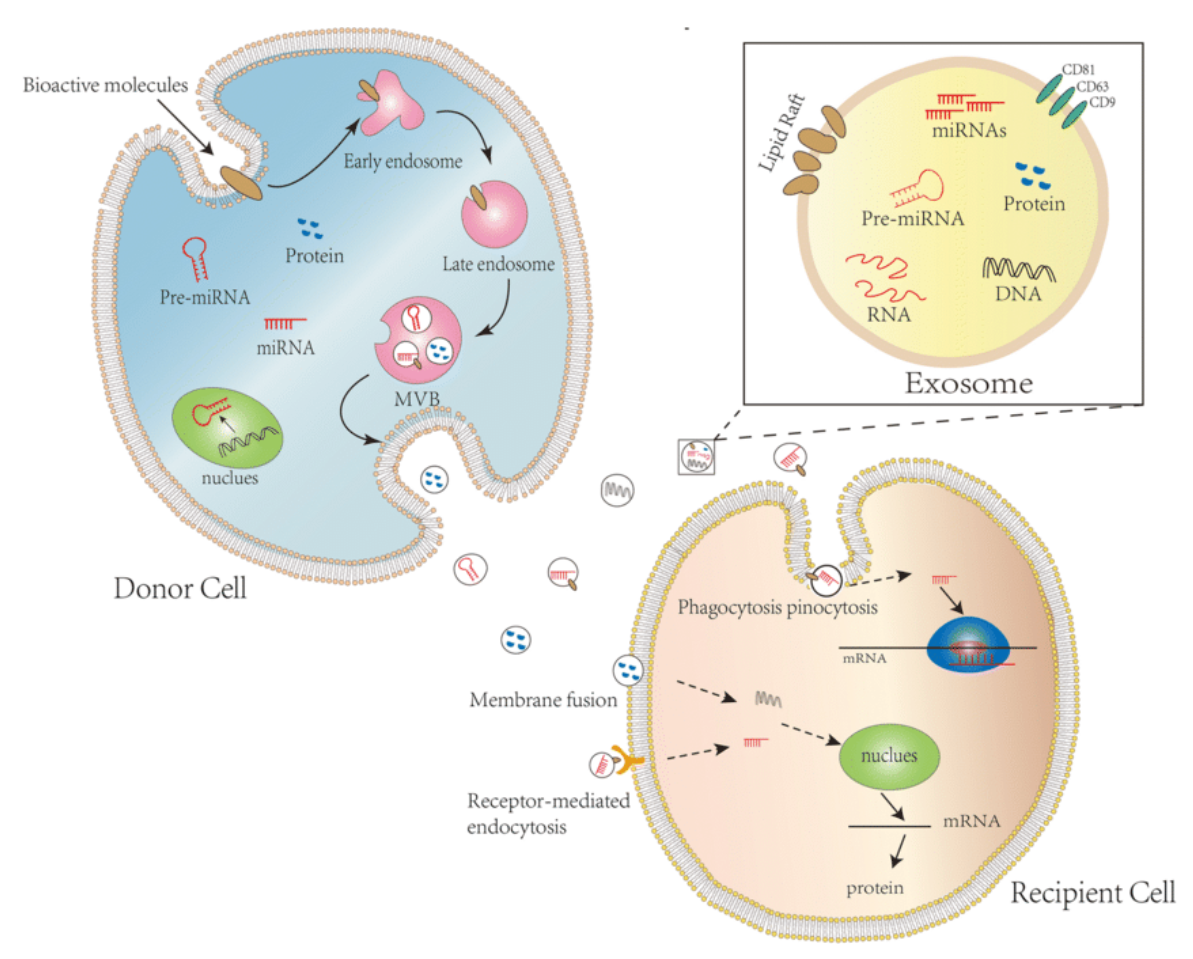Exosome Transfer Analysis Service
- Investigating exosome-mediated signaling pathways
- Profiling exosome tropism and targeting efficiency
- Evaluating exosome-based drug delivery systems
- Tracing disease-specific intercellular communication
- Comparing native vs. engineered exosome transfer
- Isolated Exosomes: ≥200 μg total protein or ≥100 μL in PBS
- Plasma/Serum: ≥2 mL per sample
- Cell Culture Supernatants: ≥5 mL per sample
- Other Body Fluids: Please inquire for specific requirements
Exosomes, as critical mediators of intercellular communication, transfer bioactive molecules—including proteins, lipids, and nucleic acids—from donor to recipient cells. This transfer process plays essential roles in physiological and pathological contexts such as immune modulation, tumor progression, and tissue regeneration. Despite the growing interest, the underlying mechanisms governing exosome release, transport, uptake, and functional cargo delivery remain incompletely understood.
Some studies have proposed multiple routes for exosome entry into target cells—including clathrin-mediated endocytosis, macropinocytosis, phagocytosis, and membrane fusion—but their prevalence and regulatory factors vary with cell type, cargo, and microenvironmental conditions. As such, there is a pressing demand for standardized, sensitive, and mechanistically informative tools to dissect the exosome transfer pathway at both population and single-particle levels.

Figure 1. The Schematic of Generation of Exosomes and the Transfer of Genetic Material by Exosomes
Service at MtoZ Biolabs
MtoZ Biolabs offers a comprehensive Exosome Transfer Analysis Service to support detailed investigation of exosome-mediated communication. We integrate molecular, imaging, and particle-tracking technologies to quantitatively assess exosome secretion, intercellular transport, recipient cell uptake, and cargo delivery. Our service platforms include:
💠Quantitative RT-PCR for sensitive detection and quantification of RNA cargo transferred to recipient cells.
💠Immunoblotting (Western blot) to verify protein transfer and monitor recipient cell responses.
💠Real-time fluorescence microscopy for visualization of exosome movement and uptake dynamics.
💠Single-Particle Tracking (SPT) to analyze the trajectory and kinetics of individual exosomes at subcellular resolution.
These approaches are adaptable to diverse experimental designs and biological systems, enabling tailored analysis of exosome behavior across in vitro and in vivo models. With deep expertise in exosome biology and advanced analytical infrastructure, MtoZ Biolabs delivers precise and reproducible data to help uncover the mechanisms of exosome transfer.
Analysis Workflow
1. Exosome Isolation
High-purity exosomes are isolated from donor cells or biofluids using ultracentrifugation, SEC, or immunoaffinity capture.
2. Labeling & Quality Control
Labeled with lipophilic dyes, fluorescent RNA probes, or luciferase constructs. Labeled vesicles are validated for intact morphology and biological activity.
3. Exosome Transfer Experiment Setup
Labeled or cargo-loaded exosomes are incubated with recipient cells in vitro or administered to animal models for in vivo tracking.
4. Monitoring Transfer Dynamics
Exosome secretion, transport, uptake, and intracellular localization are monitored using real-time fluorescence microscopy, single-particle tracking (SPT), flow cytometry, or in vivo imaging systems.
5. Molecular Verification
Transfer of specific cargo is confirmed by qRT-PCR, Western blotting, or immunostaining of recipient cells.
6. Data Interpretation and Reporting
All quantitative and qualitative data are processed and compiled into a comprehensive report, including raw images, graphs, and interpretation of transfer efficiency and localization.
Why Choose MtoZ Biolabs?
MtoZ Biolabs combines advanced instrumentation with domain expertise to deliver high-precision exosome analytics. Our platform is designed to meet the highest standards of reproducibility, sensitivity, and biological relevance.
✔️Flexible assay design based on your research needs
✔️Validated labeling and uptake platforms for both in vitro and in vivo models
✔️Expert support in experimental setup, data interpretation, and publication preparation
✔️Full confidentiality and data protection for all projects
Applications
MtoZ Biolabs' Exosome Transfer Analysis Service supports a range of basic and translational research applications:
Sample Submission Suggestions
We accept the following sample types:
Samples should be stored at -80°C and shipped on dry ice. Avoid repeated freeze–thaw cycles.
*Please consult us for tailored collection and storage protocols to maximize data quality.
Deliverables
1. Comprehensive experimental details (materials, instruments, and methods)
2. Western blot or qRT-PCR results
3. Quantitative data on exosome secretion, uptake, and cargo delivery
4. Imaging files from fluorescence microscopy or single-particle tracking
5. Custom analysis report summarizing results and interpretation
Related Services
Exosome Isolation and Purification Service
Exosome Marker Analysis Service
Exosomes Identification Service
Exosomes Metabolomics Services
Exosomal Whole Transcriptome Sequencing Service
How to order?







